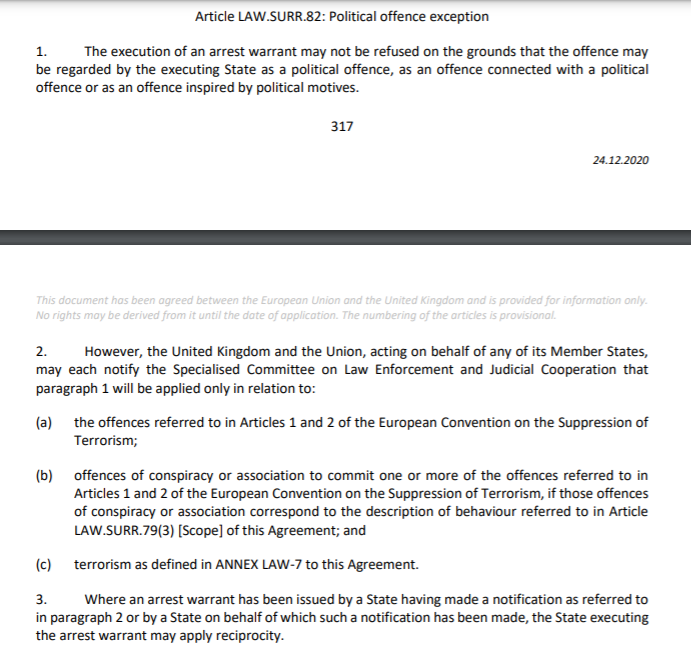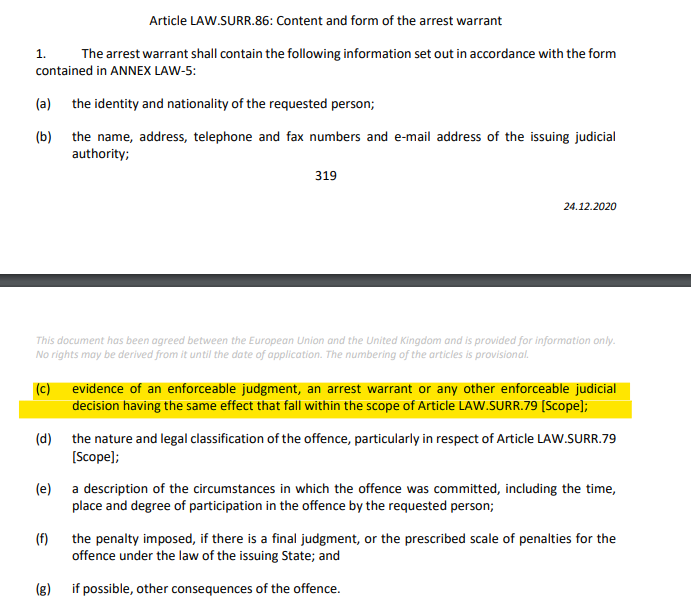
What does the Trade and Cooperation Agreement mean for the UKs #extradition arrangements with the EU27?
Lets take a quick look
Thread
Lets take a quick look
Thread
A reminder of the respective positions of the UK and the EU in their negotiations that the UK Government considered a 'UK WIN' 

As rightly said by @StevePeers, the reality is that the Agreement appears to be closer aligned to the EUs objectives, particularly given the EU wins in relation to dual criminality, ability to determine applicability for political offences and surrender for own nationals. EU WIN?
To begin with, as per previous arrangements, #extradition is referred to throughout as a 'mechanism of surrender'. Unlike the Council Framework Decision on the European Arrest Warrant, the surrender arrangement does not appear to be based on mutual trust and recognition 

Despite the UK Governments negotiating position of not seeking participation in the EAW scheme, the Agreement provisions on surrender closely follows the wording of the Framework Decision on the European arrest warrant
Proportionality is a key feature preserving the proportionality bar to extradition that was introduced inserted into the Extradition Act 2003 (Section 21A). The aim is to 'avoid unnecessarily long periods of pre-trial detention'. UK WIN 

In a WIN for the EU, the Agreement contains an ability to apply the political offence exception to surrender if notification is given to the Specialised Committee on Law Enforcement and Judicial Cooperation, but not in relation to certain terrorism offences 

Importantly there is a nationality exception. Surrender can be refused by a Union member if notification is given that they will not surrender own nationals. 16 of the EU27 do not extradite own nationals outside of the Union. EU WIN 

It is unlikely UK will make such a declaration and therefore UK nationals still at peril in the UK from arrest warrants from Union members, even if there is no reciprocity.
The guarantees to be given by the issuing member state are similar to those already given under the EAW. In relation to the transfer of sentence, it is unclear how this will be given effect in he absence of an agreement on the transfer of prison sentences 

The Content and Form of the arrest warrant appear similar to the European arrest warrant form. Interestingly, the Agreement asks for 'evidence' rather than 'information' of an enforceable judgment, [domestic] arrest warrant or other judicial decision. 

This may mean requests for surrender have to be accompanied by a copy of the enforceable decision or [domestic] arrest warrant
The proforma 'arrest warrant' contained in the Annex of the Agreement closely resembles the 'tick box' template used for the European arrest warrant 

As the UK will no longer have access to SISII, the arrest warrant can be circulated and transmitted by @INTERPOL_HQ. 

As such, expect Paragraph 4 of the Extradition Act (Provisional Arrest) Act 2020 to be brought into force that will insert the Union members into Schedule A1 of countries upon which the UK can 'provisional arrest' individuals sought on an @INTERPOL_HQ Red Notice. 

It is unclear whether the giving of 'consent' to surrender will waive an individuals specialty protection. Under the EAW, the giving of consent did not (as a result of amendments to the Extradition Act 2003 in July 2014) result in a waiver of specialty. 



Those detained in custody throughout the surrender process will continue to have such periods of detention deducted from any custodial sentence imposed in the issuing state if surrendered. 

In the event that the Agreement is suspended or terminated, arrest warrants will continue to apply to those individuals arrested prior to disapplication.
The effect of the Agreement on exiting EAWs is that it applies to those EAWs issued before the end of the transition period (31 December 2020) that have yet to be executed. 

Overall, it appears closer to a EU WIN than a UK WIN but is certainly less cumbersome, at first review, than having to rely on the European Convention on Extradition 1957, which would have been the fallback position had an agreement not been reached.
@threadreaderapp unroll
• • •
Missing some Tweet in this thread? You can try to
force a refresh




